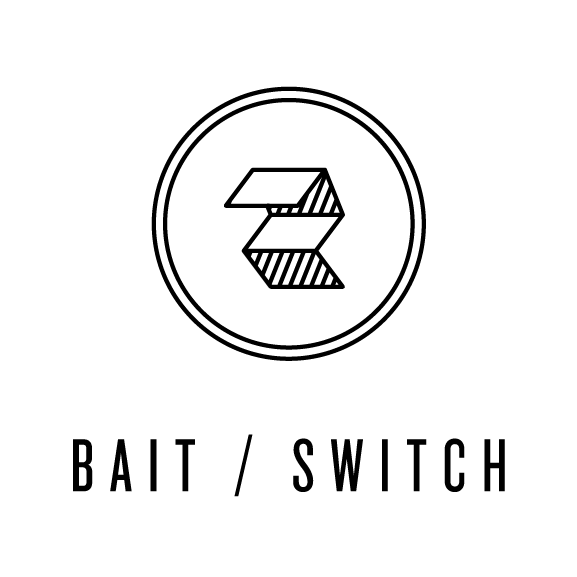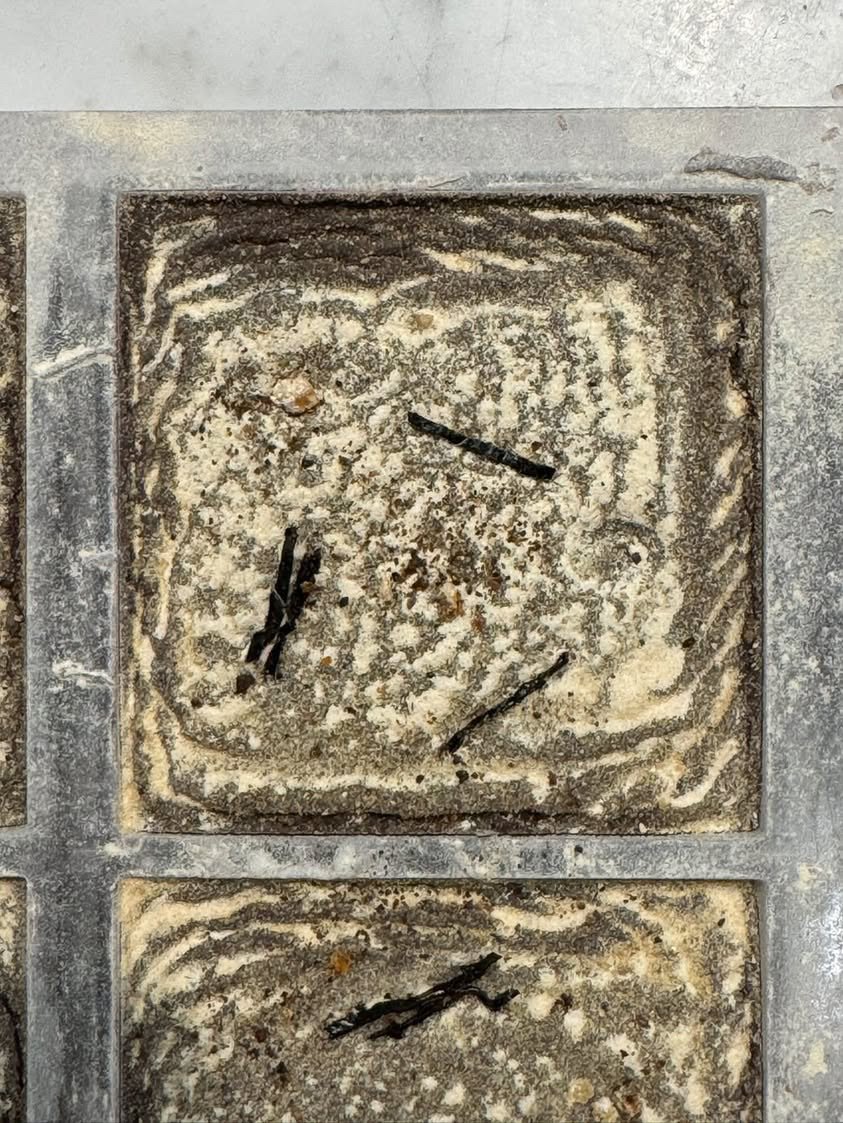Lost Island
Eric Parkes
Lost Island, chocolate bar of 70% Hawaiian cacao, cane sugar, powdered candied fermented orange peel, Cameroon pepper
“There’s something about receiving inspiration from the universe, rather than trying to give it to yourself, that is just so healing.”
Interview by L. Valena
December 9th, 2024
Can you describe the prompt that you responded to?
Process shot for Lost Island
It was a piece of music. I'm not really a lyrics person, so although I've been into music forever, I've never really bothered to notice what they're singing. For me, it's more about the music – the sound, rhythm and pitch. So on my first pass, I just listened to the music and noticed that there were words, but decided not to worry about that just yet. My first feelings about the piece were that it was kind of placid; it had a calming chord structure and I liked the feel of it. It gave me a sense of stability and serenity, with contrast in the higher vocals. Once I got into it though, I realized that I had to pay attention to the lyrics, because it seemed like an important part of the piece. There was a message of delusion, of someone's perceived feelings of someone else, and things not being what they seemed. Misunderstandings.
I decided to do a couple of different things with that. One thing was a visual thing with the bar. I'd never done this before – I kind of discovered it by accident and liked it – which was to put the powder on the back of the bar and then shake it all over before it set. That created kind of a dune effect. There's a lot of discussion in the song of desert and mirage, and so it felt like kind of a literal interpretation to create a sand dune on the back of this bar. The little pieces you see, which might look like stones or something, are bits of orange and pepper that didn't grind up all the way. The idea is to have a little bit of contrast peppering it.
The chocolate I used was a Hawaiian cacao bean. That's one of the most neutral chocolates I have. It's very comfortable, like a brownie chocolate. It's fruity, and kind of has a banana note. Depending on what season it is, the flavors can go all over the place. I wanted to create a blend with this orange ingredient, because I thought it would blend well with this chocolate and give it a more homogeneous feeling. Then I added the chili to add that contrast that was inspired by the lyrics.
Something else was going on with the ingredients. The two additional ingredients that I used were shared from other people. In the case of the orange, it was the folks at the brewery who were like, "Here, have this orange peel." The orange peel had been used to flavor a beer at the brewery I work out of, and I was given a batch of this stuff after it came out of the mash. It wasn't something I came up with on my own, it was a collaborative thing. I dried it and candied some, and it was actually quite tasty. I ground that up into a fine powder.
The chili was also like that. It was from a guy from Cameroon who I was chatting with for a long time, a really sweet guy, and he told me about this Cameroon chili pepper. And then I came in like three weeks later and there was this bag left for me with a note saying that he wanted me to try it! This felt like an appropriate project to use these ingredients, which have a personal connection. The song I responded to is also about a personal connection, but perhaps the opposite of this.
That's so cool! Yes, I think the song is definitely saying something about being disappointed in other people, and it's so cool that you were able to use these ingredients that were given to you, unbidden, by people who genuinely wanted to share.
Exactly!
Do you want to talk about your background as a bean to bar chocolate maker?
Sure! I started out as an architect, which I still do for smaller projects. I stumbled on chocolate-making back in 2011. I was in Costa Rica with my wife and two kids. Somewhere along the way, we came upon a tour of a chocolate plantation, and I went along with low expectations. It all seemed oversold somehow. But it was really cool; they showed us how the whole process happens, and were churning out basic chocolate with a peanut grinder. I was completely smitten by that. I've always had a thing for chocolate anyway. So I came back to the US, and found a guy on the West Coast who was selling small amounts of cocoa beans and some basic equipment.
There was this bean-to-bar chocolate movement, which at that point had been a thing for a few years. So I had the idea of creating a chocolate CSA. Remember how the CSA movement kind of came in hard, and started getting appropriated by everything else? So I engaged in some agricultural appropriation, and started a chocolate CSA. I did that for a couple of years, and then I came here and built out a chocolate production space.
You've been at this for a while! Do you feel like you're still learning stuff? What's changed?
Cacao being ground up, photography by Canyon Twin
The worst enemy is complacency, isn't it? Although it's also the nirvana of human experience, in a way. At the same time, when you stop evolving and creating, things become less fun. There are two things that come to mind about what has changed. One thing is that there are certain things I've learned that don't matter as much as I used to think they did. Certain processes where I was getting too fussy, and finally realized that people didn't really care as much about them as I thought. Ego has fallen back a little bit. I don't feel like I need to make a bar that's necessarily winning awards. So many people are out there doing that, and you can become kind of a slave to that process. I'm more interested in the farmer. What's their story? That's what other people seem to be interested in too. It's not that the chocolate is perfect, it's that it's interesting. Technically speaking, maybe there's less to learn now -- I think I'm doing a pretty good job with that.
Do you want to talk about the farmer who grew this cacao?
Yes! He goes by Sharkman, and he's a lovable, cranky former hippie. A friend of mine through my kid's preschool was one of the founders of Taza Chocolate. He left there right around when I began to discover chocolate. But when he was still with Taza, they had this idea of finding some domestic cacao sources, so he'd had a talk with this guy. He quickly realized that Taza needed way more than he could produce, so he sent me an email that said, "Talk to Sharkman!" When I first contacted him, I double-checked his name, and he said, "Yeah, that's how I am, always on the move!"
[Lu is gobsmacked.] Oh. My. God.
He's probably in his early-seventies now. He'd grown wine, and weed, and everything under the sun before he settled on cacao and coffee a few decades ago. Every text ends with something sweet and loveable, and yet there’s also an underlying discontent, almost crankiness, which I love. For example, I remember him telling me about being asked how he was controlling temperature while drying his cacao and his response was something like "Fuck that shit, I don't have time for that!" That’s why I call him a lovable, cranky hippie. He has about an acre of trees that he grows and harvests, and then he also has a side thing where he will grow cacao on land that is owned by people who live off-island, who snagged some land to someday build a house on. He does a good job with it. His cacao is a little bit less consistent throughout the year because it's growing at the extreme north latitude at which cacao grows. It’s subjected to more temperature swings, and the possibility of getting a week of rain when he's trying to ferment it. There's a lot of stuff that he can't control.
Eric wrapping chocolate bars, photography by Canyon Twin
That's so cool that you have an ongoing relationship with this guy.
I dread the day he emails to tell me he's done with it. That day will come, I'm sure.
But not today. Sharkman's still on the move. Is there anything else we haven't talked about that you want to mention here?
The paper wrapper is from an 1872 map of Somerville.
Having gone through this process, is there any advice you would give another creative person participating in this project for the first time?
Navigating imposter syndrome is a thing that came up for me. I'm not a musician, so am I really qualified to evaluate a piece of music? The same would have happened if it had been a painting. I think it's a question of going with your emotions and doing it that way, or trying to be analytical about it, but that's not really advice. I don't really have any advice for anyone... buy low, sell high? Whatever.
Call Number: V96MU | V97FD.paLo
Eric Parkes started off life as an architect. His ongoing transition to bean-to-bar chocolate making began following a trip to Costa Rica in 2011. His business, Somerville Chocolate, focuses on showcasing fundamental differences among cacao varietals, roasts, inclusions, with the occasional inclusion thrown in for fun.






